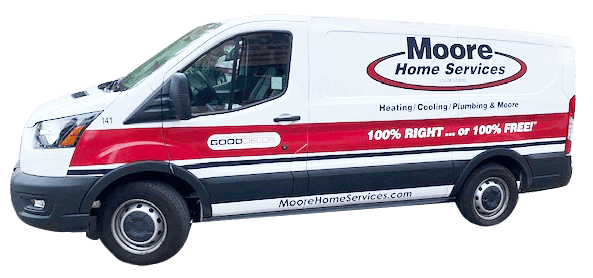The Difference Between HVAC Systems and Portable AC units
A happy home is a happy family. And for many of us, maintaining a happy home means keeping everyone comfortable on cold winter nights, hot summer days, and everything in between. To do this, many residents rely on their HVAC system.
Modern heating, ventilation, and air conditioning systems not only maintain comfortable temperatures throughout the home, but they also regulate humidity and air flow. All of these functions combined can help you and yours stay happy and even a lot healthier!
How will an HVAC system keep me healthier?
HVAC systems can help you stay healthy by regulating your home’s environment 365 days of the year.
- Spring and Summer. The mold and dust mites that aggravate allergies thrive when the weather starts to get windy in the spring and humid in the summer. An HVAC system will sense environmental changes and adjust accordingly – decreasing humidity and maintaining proper air flow to keep airborne allergens at bay.
- Winter. On the flip side, when the weather is dry, an HVAC system will ensure enough moisture is staying in your living space. Among other things, air that is too dry can cause respiratory viruses to spread, make certain respiratory issues worse (such as asthma), and cause cracked, dry skin. Through ventilation of winter air, moisture regulation, and air flow, an HVAC system will ensure you are well protected from the effects of outside weather.
What if I just want to keep cool on hot days? Do I need the HVAC system or should I get a portable AC?
Unlike the HVAC system which serves all the cooling and heating needs throughout your home, portable AC units are simple machines that cool one room at a time. Some are small enough to fit on your desk while larger ones can sit in the corner of your bedroom. They can be wheeled from room to room, plugged in wherever you need some cool air. Seems like the perfect solution right?
Unfortunately, customers are finding portable air conditioners to be impractical, less efficient, and generally more trouble than they’re worth.
Some are small enough to fit on your desk while larger ones can sit in the corner of your bedroom. They can be wheeled from room to room, plugged in wherever you need some cool air. Seems like the perfect solution right? Unfortunately, California customers are finding portable air conditioners to be impractical, less efficient, and generally more trouble than they’re worth. Here’s why:
They’re not actually that portable.
Just like any kind of air conditioner, portable models still need to exhaust warm air and condensation outside in order to keep the air within the home cool. Portable ACs don’t need to have the bulk of the unit attached to the window (like window-mounted models), but they still have to be close to a window or door so the vent hose can expel warm air. Hoses are around 5 feet long and you still need to close up the window space using the kit that comes with it. Setting it up is a process you won’t feel like doing over again just to move the unit to another room. Plus, even though they have wheels, most portable ACs are 50-80 pounds and difficult to move (especially over carpet.)
They are loud.
Portable air conditioners are one of retail’s most “returned” items. With many customers citing noise as their biggest complaint. Ranging from a gentle hum to clanging noise, customers who expect it to be as quiet as a refrigerator are often very disappointed.
AC unit or just a glorified fan?

Unfortunately, portable units work about as well as many of the fans, especially when it comes to cooling one room in the house. You might get some cooler air into the mix, but on hot, muggy days, a small AC unit is more likely to just move the air around without actually cooling it.
Multiple rooms will mean multiple portable units.
Portable units will only cool one room at a time. Small ones cost around $500 while the quieter, more robust units can cost upwards of $4,000. If you have more than two or three rooms to cool down, an HVAC system is going to a much smarter investment.
An HVAC system just isn’t in the cards for me. Are there’s other alternatives?
If you live in an apartment, or you just can’t do the full HVAC system, a portable AC unit might be the best short-term solution. However, AC specialists agree that it should be a last resort. If you need a room to be cooler, start by looking into a better fanning system for that area, assess the ventilation of the room’s windows and doors, and finally, consider purchasing a dehumidifier.
Extra humidity in the air might be making you feel hotter than you realize. A dehumidifier will remove a lot of that warm, sticky moisture hanging around your living space.
Dryer air helps you to sweat less and cool down easier. Once the air is dry, those fans you’ve been blasting to keep cool can do a better job of increasing the air flow and keeping the air cool and dry.
For additional information about HVAC systems and whether or not it’s right for you, contact Moore Home Services.

